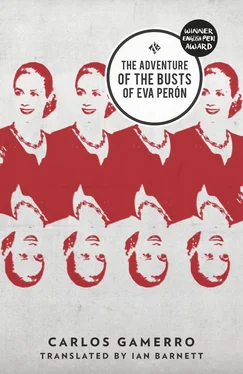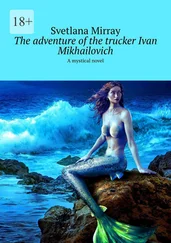Carlos Gamerro - The Adventure of the Busts of Eva Perón
Здесь есть возможность читать онлайн «Carlos Gamerro - The Adventure of the Busts of Eva Perón» весь текст электронной книги совершенно бесплатно (целиком полную версию без сокращений). В некоторых случаях можно слушать аудио, скачать через торрент в формате fb2 и присутствует краткое содержание. Год выпуска: 2015, Издательство: And Other Stories, Жанр: Современная проза, на английском языке. Описание произведения, (предисловие) а так же отзывы посетителей доступны на портале библиотеки ЛибКат.
- Название:The Adventure of the Busts of Eva Perón
- Автор:
- Издательство:And Other Stories
- Жанр:
- Год:2015
- ISBN:нет данных
- Рейтинг книги:3 / 5. Голосов: 1
-
Избранное:Добавить в избранное
- Отзывы:
-
Ваша оценка:
- 60
- 1
- 2
- 3
- 4
- 5
The Adventure of the Busts of Eva Perón: краткое содержание, описание и аннотация
Предлагаем к чтению аннотацию, описание, краткое содержание или предисловие (зависит от того, что написал сам автор книги «The Adventure of the Busts of Eva Perón»). Если вы не нашли необходимую информацию о книге — напишите в комментариях, мы постараемся отыскать её.
Carlos Gamerro's novel is a caustic and original take on Argentina's history.
The Adventure of the Busts of Eva Perón — читать онлайн бесплатно полную книгу (весь текст) целиком
Ниже представлен текст книги, разбитый по страницам. Система сохранения места последней прочитанной страницы, позволяет с удобством читать онлайн бесплатно книгу «The Adventure of the Busts of Eva Perón», без необходимости каждый раз заново искать на чём Вы остановились. Поставьте закладку, и сможете в любой момент перейти на страницу, на которой закончили чтение.
Интервал:
Закладка:
Marroné strained again, with no result save for the certainty of being far from his goal, then turned the page: the teenage Eva had now arrived in Buenos Aires with her suitcase full of hope, like so many thousands of men and women from the marginalised and impoverished hinterland who migrate to the big city in search of a better life, and embarked on her career as an actress and model. But when the last footlight had gone out, away from the illusory reality of the stage, Eva encountered the same exploitation and the same injustices in the world of the theatre as she had in the outside world . She could do little about it for the moment. Whenever she demanded improvements, whenever she made herself heard to her bosses, she was invariably fired , and the photo showed her with her back to the camera, sitting opposite a fat toad of an impresario puffing on an equally fat cigar as he tore a contract up in her face; another in a winter street, shivering in her threadbare summer coat, and, oblivious to her own distress, giving a coin to the same ragged urchin from Los Toldos (was Marroné supposed to believe the child had followed her all the way to Buenos Aires, or was this some kind of allegory?): ‘ I wanted not to admit, not to look, not to see the misfortune, the hardship, the destitution around me, so I plunged single-mindedly into my strange artistic vocation. But the more I tried to lose myself in it, the more beleaguered I was by injustice .’ The businessmen, the bankers, the rich cannot hear the cry welling up from below, from the factories, from the shanties… Eva hears it and knows that she will one day speak for them. For she is no longer the same frightened little girl: Eva has changed.
The change had been made clear by the choice of a different actress to portray her as an adult: it was visible from the first still, which showed her in a polka-dot bathing costume, her long legs bare, her feet crossed, her loose chestnut hair tumbling over her shoulders, her hands clasped behind her head to display the carefully shaven armpits. Her posture might be unnatural, uncomfortable, extremely ‘camera-conscious’, but in her forced smile and her eyes, which childishly solicited the photographer’s approval, there was a genuine, uncontaminated joy.
Next came her radio days, where she seemed to be more at ease, for she wielded the fearsome corn-cob of a microphone like a gun, with all the decisiveness of the great women of history — Elizabeth I, Catherine the Great, Isadora Duncan, Madame Chiang Kai-shek — whose lives she plays, unaware that one day she will be the greatest of them all . This was followed by a still of Eva with her hair loose, staring directly into the camera and seeming to speak directly to him, to Marroné: ‘ There comes a point in every life when we feel we have to do the same things, over and over, for the rest of our days, and that our paths are fixed for all time. But to all, or nearly all of us, there comes a day when everything changes, our “marvellous day”. For me…’
The page ended and Marroné, more intrigued than he would have liked to admit, turned it and went on reading: ‘ For me it was the day my life came together with Perón’s. That meeting marks the start of my one true life .’ The caption beneath read: In January 1944 an earthquake destroys the city of San Juan, and Colonel Perón and Eva meet at a festival for the victims. One image showed Eva atop a pile of rubble that purported to be the destroyed city, hugging the by-now ubiquitous ragged urchin from Los Toldos; another image showed her touching the epaulette of the uniformed man seated in front of her. Yet it was neither the images nor their captions, but Evita’s words, that really made him stop and think. What, if he’d already had it (‘ all, or nearly all of us ,’ announced the bold print of Eva’s admonition, with harsh sincerity), had been Marroné’s ‘marvellous day’? ‘It could hardly have been the day his life had joined with his wife’s,’ one side of his mind whispered to him insidiously, while in a guilty reflex the other tried to conjure up images of domestic bliss: the house and garden in Olivos, the double bed, the two cots… Yet here he was in an occupied factory, disguised as a worker, reading a photonovel of the life of Eva Perón, and all of that seemed as far removed from the here and now as the abundant offspring of Gauguin and his stern Danish wife were from Tahiti. It was also possible that his ‘marvellous day’, he told himself with a shudder, had been the day of his interview with Sr Tamerlán. He found it painful to admit, but it was possible. Or perhaps it had been the day Govianus had set him his mission. It was hard to say for sure. Because the ‘marvellous day’ might already have happened, or might be happening now, this very instant (the bold type of the photonovel seemed to be shadowing his thoughts) and you might not realise until much later. Or the ‘marvellous day’ might arrive disguised as a catastrophe: the ‘one true life’ of Lester Luchessi, for example, had started the day he was unceremoniously fired from the Michigan Real Estate Co: without the goad of his outrage and panic he might never have become that providential man who saved the Great Lakes Building from rack and ruin, or the author of Autobiography of a Winner . So Marroné’s ‘marvellous day’ could well be today and this apparent dead end. The change in Luchessi’s life had come at fifty-something, the same age as Ray A Kroc or Alonso Quijano… or Juan Domingo Perón, he realised in amazement, swiftly flicking through the boxes introducing the newcomer to Eva’s life.
Who was this handsome but obscure colonel that had become a household name overnight? asked the text, and proceeded to answer its own question with scant biographical details and a tedious list of Perón’s achievements as head of the Secretariat of Labour, which Marroné skipped without compunction. He wasn’t interested in this smiling, made-up Lugosi; he thirsted only for Eva. By the time he ran into her again, she had become Perón’s mistress and was sitting at the far end of an unlikely but convivial café table, at which were gathered the motley adversaries of the now-famous couple: an indignant soldier in epaulettes wearing a cap with a visor and with a bubble saying ‘ He has the cheek to take that slut on parade with him! ’; a ranch-owner dressed like an English lord, who reminded him of his father (‘ Before he filled their heads, labourers were meek and went about their work with a happy smile ’); a bespectacled man who wore a goatee and a French beret, which presumably marked him out as an intellectual of the left (‘ Perón is a Nazi Fascist, no doubt about it ’); a snooty oligarch looking as if she could smell shit (‘ You can’t make a silk purse …’); and a priest with an expression of infinite disapproval, who kept his counsel, having run out of space for a bubble. Beside them, shrugging off the inevitable criticism of the conservatives, there emerged from Eva’s mouth the barbed words: ‘ Soon, along the wayside, our hypercritics began to shower us with threats and insults and slurs. “Ordinary men” are the eternal enemies of everything new, of every extraordinary idea and therefore of every revolution .’
It had been the same with him, thought Marroné, when he’d brought back all those innovative ideas from the United States: he too had been held up as a madman and dreamer by ‘ordinary men’ like Cáceres Grey, who viewed him ‘indulgently’, ‘pityingly’, with that air of superiority adopted by the mediocre when faced by true men of genius. Don Quixote had also been thought mad by the ‘mediocre men’ of his village, but it was his name that was written in stone, while the hand of time had erased the names of the sane and the sensible, dissolved for ever in the half-baked wash of their inane vacuousness. ‘ I will not stop for barking dogs ,’ added Evita proudly, in allusion to that famous saw from the Quixote, ‘You know you’re riding, Sancho, when you hear the dogs bark.’
Читать дальшеИнтервал:
Закладка:
Похожие книги на «The Adventure of the Busts of Eva Perón»
Представляем Вашему вниманию похожие книги на «The Adventure of the Busts of Eva Perón» списком для выбора. Мы отобрали схожую по названию и смыслу литературу в надежде предоставить читателям больше вариантов отыскать новые, интересные, ещё непрочитанные произведения.
Обсуждение, отзывы о книге «The Adventure of the Busts of Eva Perón» и просто собственные мнения читателей. Оставьте ваши комментарии, напишите, что Вы думаете о произведении, его смысле или главных героях. Укажите что конкретно понравилось, а что нет, и почему Вы так считаете.











